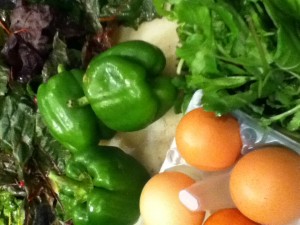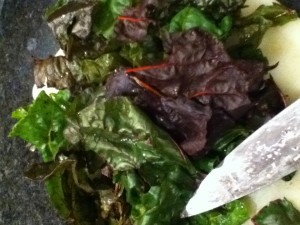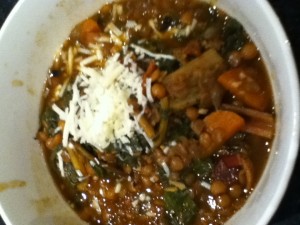You are what you eat…
I don’t know what it is about this year, but I keep getting drawn to the subject matter of eating better food. And by eating better food, I mean stuff that is more minimally processed–to include less pesticides and chemicals added to it for a multitude of reasons (cheaper, longer shelf life and to make it taste better if you are removing some of the things that make it taste good, like fat). Just by definition, because you add less crap to it, more than likely it will be better for you, but if you also focus on the food itself and how fresh it is it will also probably taste better.

I always have enjoyed cooking, but have never really put a whole lot of thought into where it comes from. Over the years, more than likely what lands in my grocery cart is driven either by what’s on sale or what is needed for a recipe that I’d like to make. I generally never paid much attention to where it came from. If I want oranges in winter, well heck, Florida sends them right to my door ready and waiting. Asparagus in the end of summer–no prob, it’s summer somewhere. You can always score some yummy produce from Chile!
One of the books that my book club has delved into recently was called “Animal, Vegetable, Miracle”, by Barbara Kingsolver. It’s the story of a woman who challenged herself and her family to eat locally, defined by obtaining foods within a 50 mile radius or from her own small family plot of land. Although very extreme by today’s families’ standards, some of the points she brought up made me think about food in ways I had never thought of. This woman went to the extreme of raising her own turkeys/hens, goats and using the milk, eggs and eventually butchering whatever animals that would not be used the following year for breeding more animals. Without getting too deep into the story, she made me think long and hard about some of the methods we use and the sacrifices that result in lower food quality and in the huge price on our environment that shipping food so cheaply to our doorsteps has made in our American society. Until she spelled it out so clearly, I never put much thought into how much energy is spent on getting that item I need for my recipe that I want to make. The sheer volume of fuel spent on shipping food worldwide is mind boggling. And the very bottom line was from her perspective, if we ate food near us that wasn’t bred to look pretty and travel well, it just plain tastes better. After I read the book, I actually took time to think before grabbing that really great priced bag of shrimp that was shipped all the way from Thailand. It also discussed the methods for how our meat is processed, and the conditions that were described were truly disgusting: animals bred and kept such that they can’t even stand and are mired knee deep in their own feces. Hmm. Makes it abundantly clear one of the ways that serious germs end up in our food chain. She brought a new perspective to knowing how your animals used for meat are raised and treated–and implied that animals and the meat we get from them can find a natural place in what we choose to put into our mouths.
Although I admit, the book didn’t completely change the way I cook and buy food, it certainly got my wheels turning enough. I am truly frugal by nature, and comparing the prices of organic foods can be pretty daunting. I was looking over some grass fed meat and the regular old stuff and for meat that was probably twice as much money and had almost less than half in quantity, even though I knew it was probably much better for us, I couldn’t buy the “better” meat–my frugal nature just wouldn’t let me do it. I went for the cheaper steaks that had way more meat for the money. But, I do try to stick as much as I can to stuff that’s actually in season, and if it’s not a huge difference in price, I do try and get organic food.
Not long after reading this book, I started seeing an eastern doctor to treat some allergies. He informed me of some foods that my body was more than likely sensitive to and to avoid, but above all, he said my body would be much better off over all, no matter what I’m eating if I just stick to the outside aisles of the grocery store and try to eat foods that are more minimally processed. He also suggested that I am sensitive to wheat and would be better to avoid it. I still eat stuff now and then that I probably shouldn’t–who can resist a good old oreo every now and then–but I think I just feel better overall since I’m eating less processed foods. My husband also is reaping the benefits as a diabetic–he’s dropped a bunch of weight and his sugar numbers are better than they’ve ever been.
My husband is a FLL lego robotics coach–and guess what their theme is this year? Food safety. Man, how many more times is this topic going to come across my path? As a team, one of the films we watched was Food Inc., and man, it’s just mind boggling to see the way the animals are treated, and what they do to it before we get it. Rinse it with ammonia to clean it of e-coli? Ewww. Especially when I’ve heard that if you just stop feeding them corn for a couple weeks before slaughter, you’d dramatically reduce the incidence of e-coli. It also brought up topics like crappy food is cheaper–when a family was portrayed trying to buy healthy vegetables, they showed quite clearly that it can be a lot more expensive than just rolling through the drive through and ordering off the dollar menu. It also brought up how our government is subsidizing soy and corn such that it makes it so much cheaper to buy, that poor farming communities have been driven further into poverty because they just can’t compete with such underpriced food from America.

Recently I came upon some information for a CSA–Community Supported Agriculture. Once a week I receive a small bag of produce that comes from a local farm which uses organic methods. It’s not particularly cheap, but considering it’s organic, it wasn’t a bad way to “force me” to buy locally, and to think a little differently about what I am cooking. The food tastes good because it’s fresh, has less chemicals to ingest into my family’s bodies, and is also supporting a local business as well. Pretty win win. It’s also been fun for me to try and cook some things that I’ve never had before–I still have yet to figure out what to do with the kholarbi from this week, but that’s half the fun.

It’s always hard to think how I, as an individual, can make a difference, but I already know the answer. Our markets are driven by consumers and their purchases, so the more we demand foods that are produced in safer environments, we’ll have more of them available, and more than likely that will also help drive prices lower too.
Some interesting last thoughts. My eastern doc mentioned that when wheat sensitive patients travel internationally, they generally don’t have issues eating wheat overseas. Is that because of the genetically altered food that is grown here? Who knows? But it sure made me think. For example they’ve developed corn that still grows when sprayed with round up–awesome that it kills all the weeds, but I guess that means I am eating corn that’s been sprayed with round up! Who knows how that will affect me and mine over the years? Having had been fortunate enough to have traveled overseas I can attest personally that the same foods we have here just taste better there–better tasting, more flavorful. Is that because they only eat the closest, freshest foods? I don’t know, but the difference in taste for the better was huge.
I’m hoping this is one of the times that the media works for our benefit–maybe not in my lifetime, but hopefully in my kids to get us back to the basics and demanding to know more about what happens to our food before we get it. I’ve got to imagine that we will be less fat and healthier overall if we keep moving in this direction…
Scary stuff isn’t it? We’ve made some changes in our household – some have been easier than others – but overall we feel better!
Yes, it sure is. It’s also very tough to get your mindset off of lifelong habits as well. Eating better definitely requires some discipline as you need to rethink some of your old ways, but there are lots of really good alternatives if you dig deep enough.